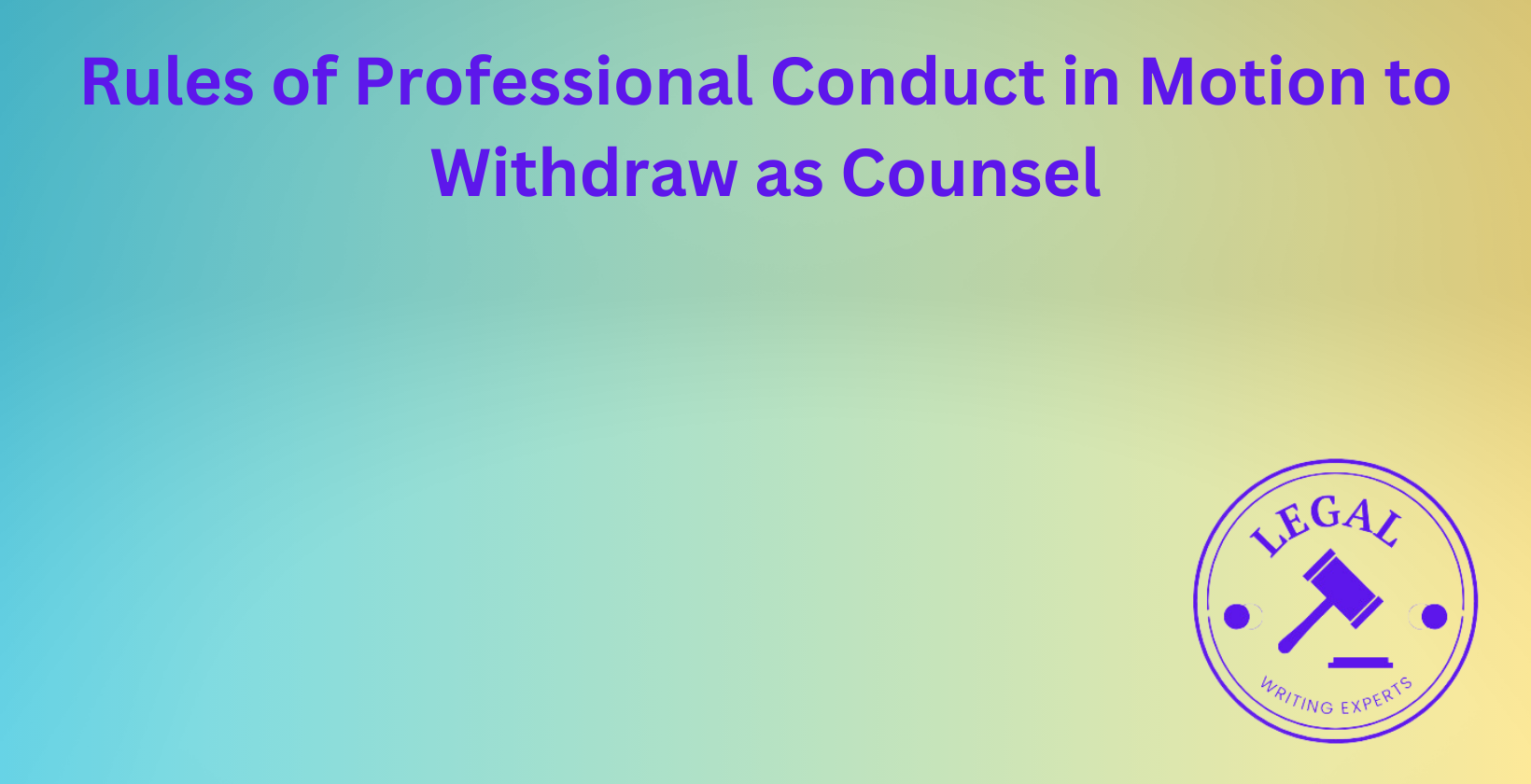Rules of Professional Conduct in Motion to Withdraw as Counsel
Written by
Jessica E
February 21, 2025 · 8 min read

The rules of professional conduct govern how attorneys handle motions to withdraw as counsel to ensure ethical and legal compliance. The decision to withdraw from representation must align with professional responsibility guidelines to protect client interests and maintain the integrity of legal proceedings. Attorneys must adhere to strict regulations, whether withdrawal is mandatory or voluntary. Courts assess motions based on legal and ethical principles to prevent prejudice to clients. Understanding the procedural and ethical aspects of withdrawal ensures compliance with the law while upholding client rights.
What Are the Rules of Professional Conduct Regarding Withdrawal as Counsel?
The rules of professional conduct regarding withdrawal as counsel dictate when and how an attorney can discontinue representation. According to the American Bar Association (ABA) Model Rules of Professional Conduct, Rule 1.16 outlines the conditions for both mandatory and voluntary withdrawal. Attorneys must follow procedural requirements to protect client interests and avoid ethical violations. Courts evaluate withdrawal motions based on compliance with professional conduct standards.
When Is Withdrawal as Counsel Mandatory Under Professional Conduct Rules?
Withdrawal as counsel is mandatory when continued representation would result in a violation of ethical or legal obligations. Under ABA Model Rule 1.16(a), attorneys must withdraw if representation involves assisting in criminal or fraudulent conduct, if they are physically or mentally unable to continue, or if they are discharged by the client. Failure to withdraw under such circumstances may lead to disciplinary actions or professional liability.
What Are the Permissible Reasons for Voluntary Withdrawal as Counsel?
The permissible reasons for voluntary withdrawal as counsel include client misconduct, nonpayment of fees, or fundamental disagreements over case strategy. ABA Model Rule 1.16(b) allows attorneys to withdraw if the client engages in fraudulent or illegal conduct, refuses to follow legal advice, or fails to fulfill obligations under a representation agreement. Courts require attorneys to provide reasonable notice and ensure withdrawal does not prejudice the client’s case.
How Should an Attorney Properly File a Motion to Withdraw as Counsel?
An attorney should properly file a motion to withdraw as counsel by submitting a written request to the court and providing notice to the client. The motion must include the grounds for withdrawal and comply with jurisdictional procedural rules. Courts may require a hearing to determine whether withdrawal is justified. Attorneys should redact confidential client information when filing motions to comply with legal and ethical obligations.
What Steps Must Be Taken to Protect a Client’s Interests Upon Withdrawal?
The steps that must be taken to protect a client’s interests upon withdrawal include providing adequate notice, assisting in the transition to new counsel, and surrendering relevant case documents. ABA Model Rule 1.16(d) requires attorneys to mitigate potential harm by advising clients on pending deadlines, transferring case files, and refunding unearned fees. Failure to take these steps may result in professional misconduct claims.
How Do Courts Evaluate Motions to Withdraw as Counsel?
Courts evaluate motions to withdraw as counsel by assessing whether the request aligns with ethical rules and procedural requirements. Judges consider the timing of the motion, potential harm to the client, and the impact on case proceedings. Courts may deny withdrawal requests if they disrupt litigation, delay justice, or prejudice the client’s legal position. Attorneys must demonstrate valid reasons for withdrawal and propose solutions to minimize case disruptions.
What Are the Ethical Considerations in Withdrawing from Representation?
The ethical considerations in withdrawing from representation involve maintaining client confidentiality, avoiding conflicts of interest, and ensuring a smooth transition. Attorneys must uphold professional responsibility by preserving attorney-client privilege even after withdrawal. Ethical violations may result in disciplinary actions, legal malpractice claims, or reputational damage. Compliance with legal drafting services and professional conduct rules is essential in withdrawal cases.
How Can an Attorney Avoid Prejudice to the Client When Withdrawing?
An attorney can avoid prejudice to the client when withdrawing by ensuring continuity of representation and providing necessary case information. Courts expect attorneys to help clients find alternative counsel, communicate upcoming legal obligations, and facilitate case document transfers. Failure to prevent prejudice may lead to court sanctions or ethical complaints.
What Are the Consequences of Failing to Follow Proper Withdrawal Procedures?
The consequences of failing to follow proper withdrawal procedures include disciplinary actions, court sanctions, and potential malpractice claims. Attorneys who abandon clients without notice or fail to comply with ethical rules may face license suspension or disbarment. Courts may also refuse to grant withdrawal requests if procedural requirements are not met.
How Does Withdrawal as Counsel Differ in Civil and Criminal Cases?
Withdrawal as counsel differs in civil and criminal cases due to the constitutional right to counsel in criminal proceedings. In civil cases, courts may grant withdrawal if it does not unduly prejudice the client. In criminal cases, withdrawal is more restricted because defendants have a right to legal representation. Courts may deny withdrawal requests if they jeopardize a defendant’s right to a fair trial.
Where Can One Hire a Legal Writer to Draft a Motion to Withdraw as Counsel?
One can hire a legal writer to draft a motion to withdraw as counsel through legal drafting services, freelance legal research professionals, or online legal document providers such as Legal Writing Experts. Legal research companies and freelance legal drafting services offer expertise in drafting legal motions that comply with court requirements. A legal document writer can ensure proper formatting and legal accuracy.
How Much Does It Cost to File a Motion to Withdraw as Counsel?
The cost to file a motion to withdraw as counsel varies depending on court fees and attorney expenses. Filing fees range from $50 to $500, depending on the jurisdiction. Hiring legal document drafting services or a lawyer to prepare the motion may add costs ranging from $200 to $1,500. Attorneys charging hourly rates may bill between $150 and $500 per hour for withdrawal-related legal work. Online legal document services provide cost-effective alternatives for drafting motions.


